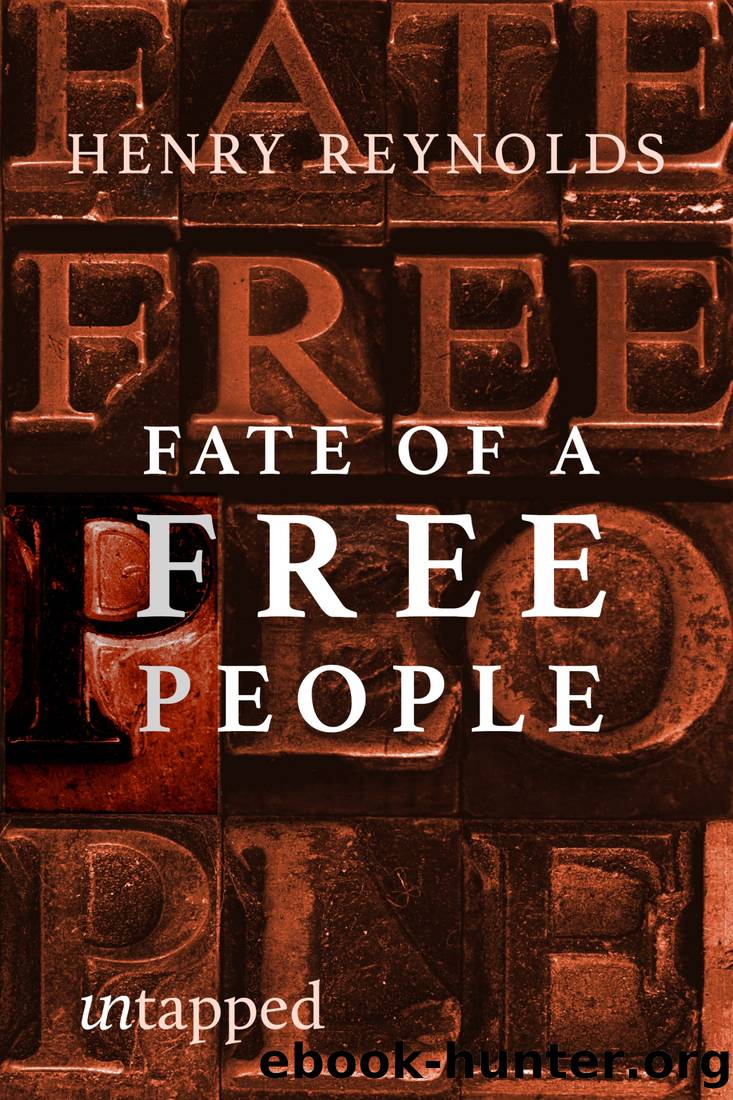Fate of a Free People by Henry Reynolds

Author:Henry Reynolds [Reynolds, Henry]
Language: eng
Format: epub
ISBN: 9781922730633
Publisher: Ligature
Published: 2021-11-13T21:49:42+00:00
5. An Agreement With The Old Governor
With the Black War over, Governor Arthur was remorseful about his part in the destruction and dispossession. His feelings were quite genuine. But he no doubt also realized that he had to trim his sails to the swelling humanitarian breeze blowing through the Colonial Office. He had, after all, been implementing policies now totally disowned by its officials. So in 1833 he wrote to the Secretary of State, Lord Goderich, observing that he found it distressing to recall the âinjuries that the Government [was] unwillingly and unavoidably, made the instrument of inflictingâ; of being reduced to the necessity of âdriving a simple but warlike, and, as it now appears, noble-minded race, from their native hunting groundsâ.368
Arthur was even more confessional when writing to Lord Glenelg in 1837 after his return to England. He observed on that occasion:
On the first occupation of Van Diemens Land a very injudicious course of proceedings was followed towards the Natives, and I deeply lament to acknowledge that, being incapable of forming any opinion of my own, based upon experience, and being perplexed by the adverse opinion of others, I fell into some very wrong notions in the early part of my Government, from whence very injurious consequences resulted.369
While reflecting on what had gone wrong in Tasmania, Arthur urged the Colonial Officeâs officials to negotiate treaties and arrange for the purchase of indigenous land in all future colonizing ventures. He pushed this policy in letters written in 1832, 1835 and 1837. âOn the first occupation of Tasmaniaâ, he observed in 1835, it was âa great oversight that a treaty was not, at that time, made with the natives and such compensation given to the chiefs as they would have deemed a fair equivalent for what they surrenderedâ. Arthur believed they would have been satisfied with âa mere trifleâ.370 But even a trifle would have amounted to a clear acknowledgement of prior ownership.
Arthurâs earnest advocacy of the need for treaties was probably an important influence on the decision of the Colonial Office to negotiate the Treaty of Waitangi with the Maori chiefs in 1840 as a prelude to the settlement of New Zealand. During the second half of 1837, when New Zealandâs future was being considered, Arthur was in Britain and in âhabitual intercourseâ371 with Lord Glenelg. His views were also a likely reason for the decision by the Tasmanian-based entrepreneurs of the Port Phillip Association, led by John Batman, to sign a treaty with the local clans around Port Phillip in June 1835. Arthurâs nephew Henry was a member of this syndicate, whose plans to purchase Aboriginal land may have been carefully crafted to win the governorâs approval.
From an international perspective, Arthurâs interest in treaties was not surprising, particularly as he had spent eight years in the Americas. Treaties had been negotiated with American Indians since the seventeenth century and continued to be the normal way of arranging the relations between settlers and indigenous people until the 1870s.
But what of
Download
This site does not store any files on its server. We only index and link to content provided by other sites. Please contact the content providers to delete copyright contents if any and email us, we'll remove relevant links or contents immediately.
The Memory Code by Lynne Kelly(2401)
Schindler's Ark by Thomas Keneally(1887)
Kings Cross by Louis Nowra(1798)
Burke and Wills: The triumph and tragedy of Australia's most famous explorers by Peter Fitzsimons(1427)
The Falklands War by Martin Middlebrook(1386)
1914 by Paul Ham(1347)
Code Breakers by Craig Collie(1253)
A Farewell to Ice: A Report from the Arctic by Peter Wadhams(1249)
Paradise in Chains by Diana Preston(1247)
Burke and Wills by Peter FitzSimons(1238)
Watkin Tench's 1788 by Flannery Tim; Tench Watkin;(1232)
The Secret Cold War by John Blaxland(1213)
The Protest Years by John Blaxland(1207)
THE LUMINARIES by Eleanor Catton(1196)
30 Days in Sydney by Peter Carey(1160)
Lucky 666 by Bob Drury & Tom Clavin(1155)
The Lucky Country by Donald Horne(1142)
The Land Before Avocado by Richard Glover(1120)
Not Just Black and White by Lesley Williams(1087)
